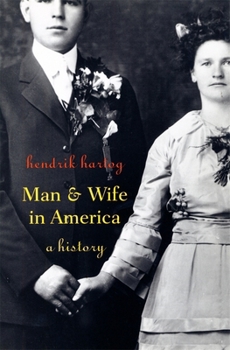Man and Wife in America: A History
Select Format
Select Condition 
Book Overview
In nineteenth-century America, the law insisted that marriage was a permanent relationship defined by the husband's authority and the wife's dependence. Yet at the same time the law created the means to escape that relationship. How was this possible? And how did wives and husbands experience marriage within that legal regime? These are the complexities that Hendrik Hartog plumbs in a study of the powers of law and its limits. Exploring a century and a half of marriage through stories of struggle and conflict mined from case records, Hartog shatters the myth of a golden age of stable marriage. He describes the myriad ways the law shaped and defined marital relations and spousal identities, and how individuals manipulated and reshaped the rules of the American states to fit their needs. We witness a compelling cast of characters: wives who attempted to leave abusive husbands, women who manipulated their marital status for personal advantage, accidental and intentional bigamists, men who killed their wives' lovers, couples who insisted on divorce in a legal culture that denied them that right. As we watch and listen to these men and women, enmeshed in law and escaping from marriages, we catch reflected images both of ourselves and our parents, of our desires and our anxieties about marriage. Hartog shows how our own conflicts and confusions about marital roles and identities are rooted in the history of marriage and the legal struggles that defined and transformed it.
Format:Paperback
Language:English
ISBN:0674008111
ISBN13:9780674008113
Release Date:April 2002
Publisher:Harvard University Press
Length:416 Pages
Weight:1.34 lbs.
Dimensions:1.1" x 6.0" x 9.2"
Customer Reviews
1 rating
The Way They Were
Published by Thriftbooks.com User , 24 years ago
With numerous deftly chosen stories of husbands and wives and their contact and experience of the law from the Colonial Era to the present, Hartog describes the slow development of our modern conception of individual rights. This is for the most part the story of wives' evolution from the state of coverture (where the husband was sovereign) to that of an equal partnership of two individuals. Along the way, Hartog develops some striking insights such as his conception of frontier states competing in a "divorce market" for divorcing couples in order to draw potential settlers to their states. Other states, such as California, wrote liberal laws that promised equal treatment for wives as a way to entice women settlers to there -- a kind of rights marketplace. His great achievment is to evoke over the course of U.S. history, the changing expectations and the responsibilities of husbands and wives as to what constitutes a proper marriage. At the same time, he discusses societal ideals embedded in the law, and the pragmatic judges who refashioned those ideals to better reflect the evolving relationships of husbands and wives. He shows that the institution of marriage, ostensibly the most intimate and private and natural of all personal relationships, has close and obtrusive links to conceptions of public governance and individual rights. Too, he show that the two "institutions," which seem so different from one another -- marriage, (private and personal), as compared to the state (public and bureaucratic) -- modify and reinforce each other through the agency of the judiciary. Thoughtful, illuminating, substantial, this is a long pleasant walk through the past with a very engaging, studious and knowledgeable, but never pedantic, friend.





